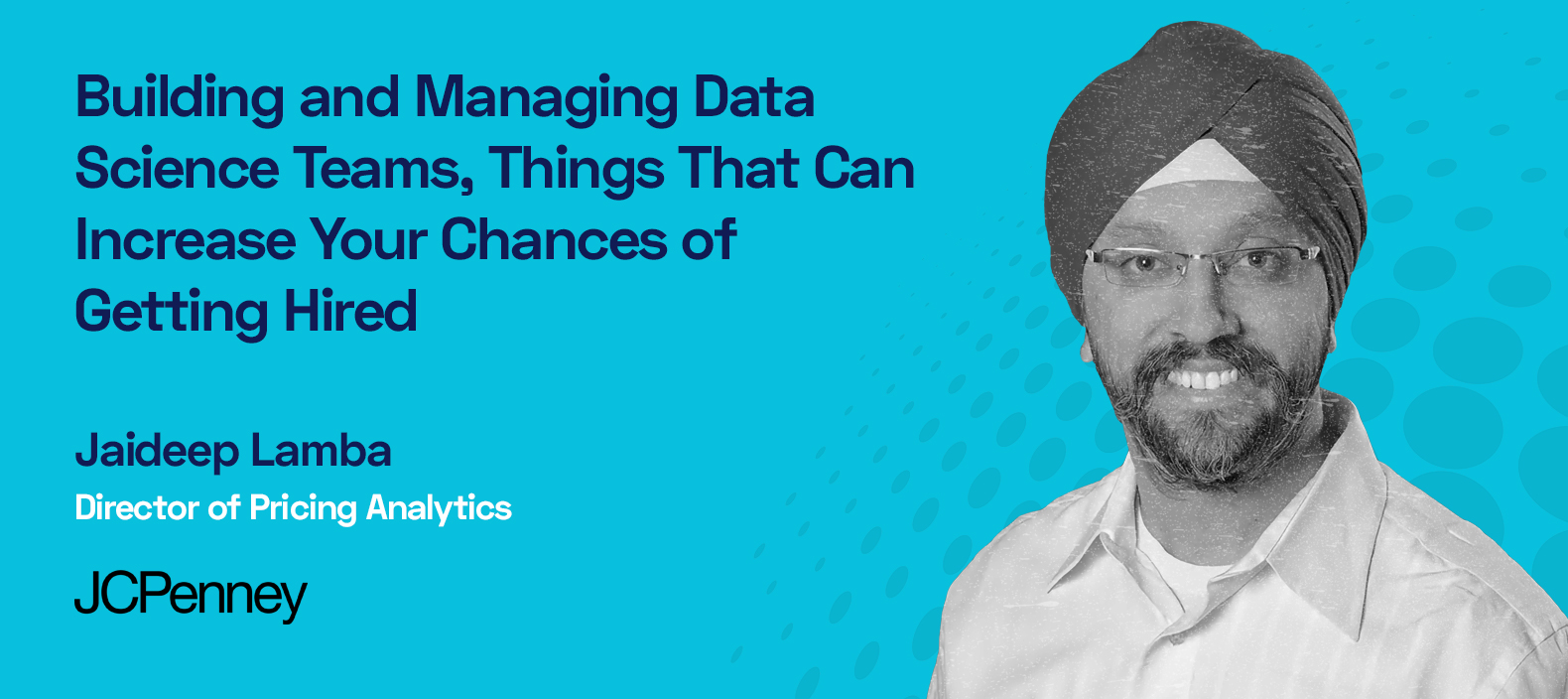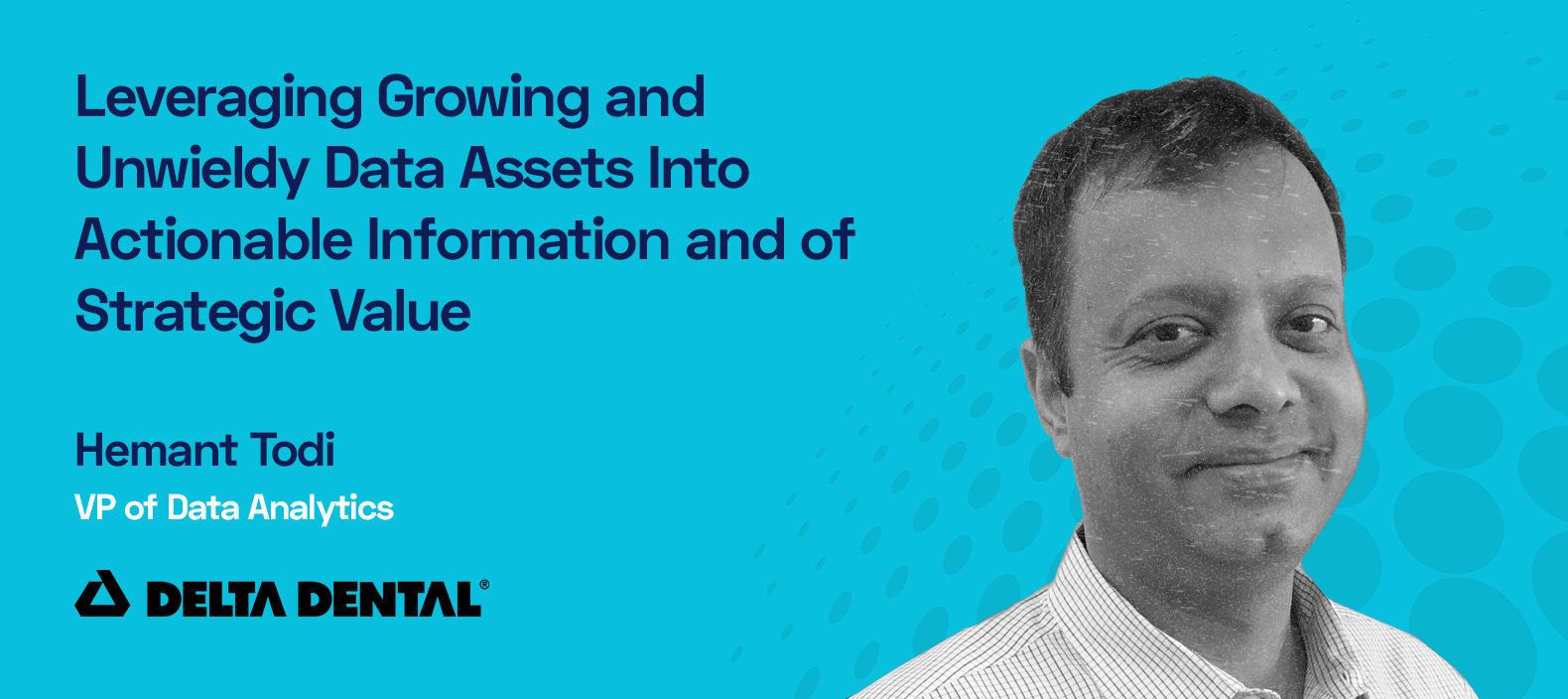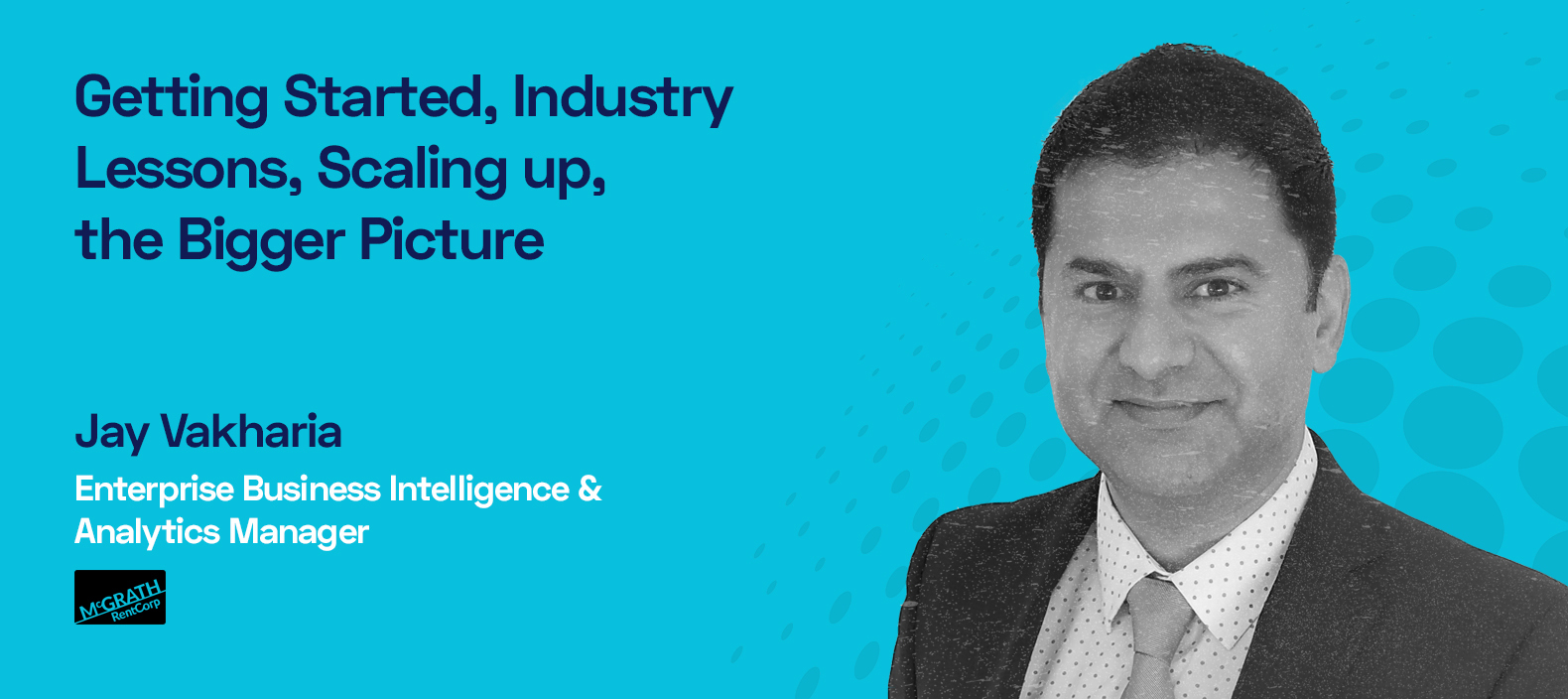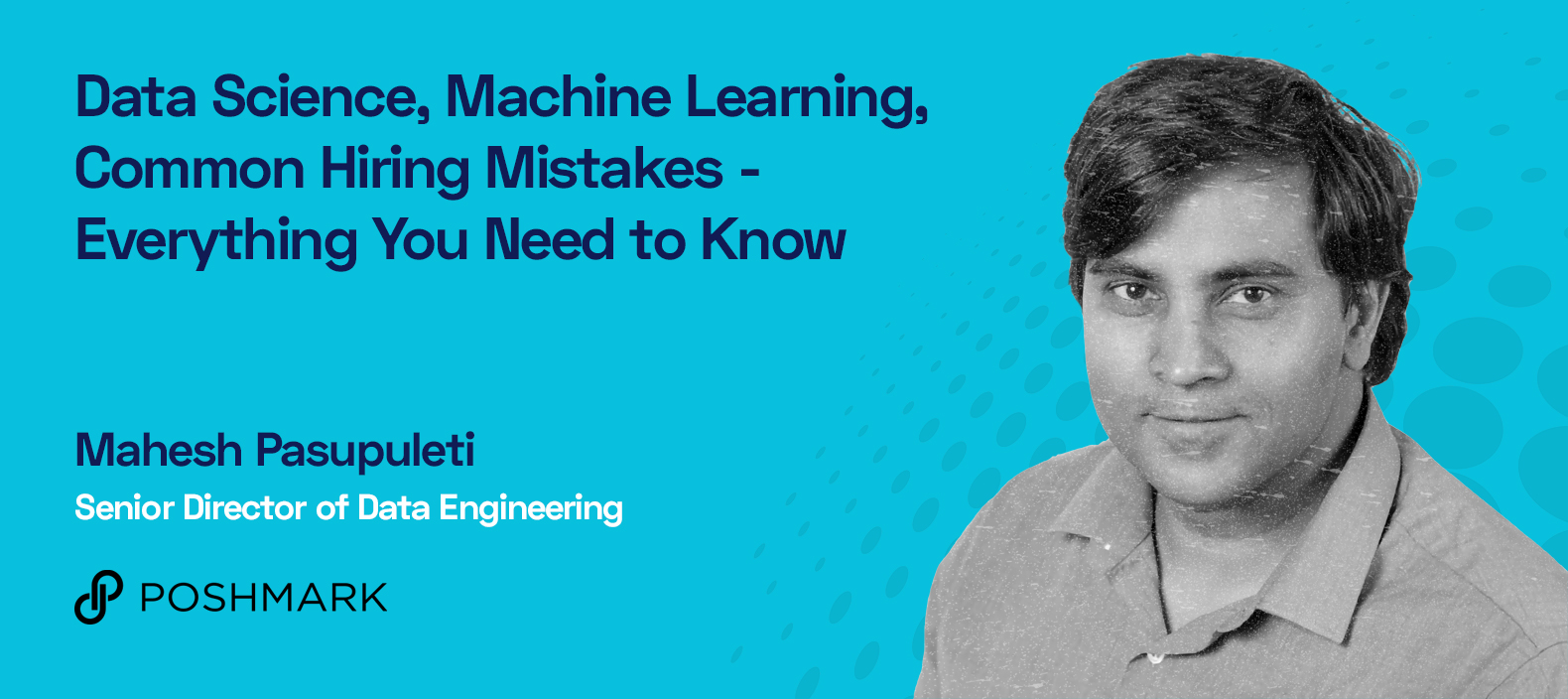The Interview with the Hiring Manager series from DataMatrix aims to provide aspiring data science, engineering & analyst candidates a glimpse of how potential hiring managers view the field. In this series, Hiring Managers share best practices, tips & feedback for prospective candidates.
This week, we speak to Jaideep Lamba1, Director of Pricing Analytics at JCPenney. Jaideep began his career as a software design engineer at Spatial Wireless, a startup that was acquired by Alcatel. He worked there for several years before joining the Bell Labs group. After leaving Alcatel-Lucent, he started and ran the Advanced Data Analytics team at Rent-a-Centre, eventually becoming Director of Advanced Analytics. He then worked as an Individual Contributor at Capital One, before moving to his current position at JCPenney.
Could you tell us a little bit about your career journey and what brought you into data science?
My first job was in a startup as a software engineer for core telecom products. As it was a startup, I wore many hats, doing end-to-end development, testing, deployment, troubleshooting, and so on.
My first foray into data science was with a Bell Labs project, where I was hand-selected for a team developing a proof-of-concept into a commercial product with 99.999% uptime availability. We collected and analyzed data traffic for telecom operators at scale for insights into fraud, infrastructure bottlenecks, application popularity, and so on. This was in 2010, when 4G was just getting launched and cloud infrastructure was still in its infancy. So, there was a lot of activity in the telecom space, and a lot of folks like me were looking at big data, though there was no term such as data scientist.
That led me to an opportunity on the business side at Rent-a-Center, where they wanted to start an advanced analytics group. They wanted the team to be part of finance—and not IT— and to look at data from the business side, rather than as a pure technology implementation. I formed that team and led it for five years. We looked at a variety of problems, from customer churn and segmentation to interesting questions of how product packaging creates or dilutes value.
After that I was itching for some product development experience. So, I went to Capital One and stayed there as an individual contributor. The mandate was to develop products for operational engineering, for our SREs, so that they could keep the infrastructure up and running and reduce the downtime.
Currently, I am with JCPenney in pricing analytics, where we track a few billion dollars in sales, over 500 stores, and a large and growing ecommerce channel to pinpoint what levers we can pull in pricing to make a significant impact to the bottomline or topline.
What have been some of the key learnings and shifts in the data science field as you’ve journeyed through it?
The business side has a huge appetite for insights based on data science. Data science teams in business units end up being the bridge between IT and the business. In the IT world, the expectation is to get a clear set of requirements and deliver to them. This is often time-consuming. Business units need to make decisions often and quickly to run their operations, and don’t have the patience to go through complete requirements-gathering processes. Data science teams have to gauge this urgency and scope the project according to their business knowledge. Mismatched gaps will result in lost opportunities.
So, the biggest lesson for me is that, before even thinking about what algorithms, solutions, or technologies you are going to use, you have to understand what people do today, the flow of their data and decision-making. Once you identify that part, you have to test your hypotheses with rapid prototyping and experimentation. With business this is even more important because they will take a decision on problems in a matter of days or weeks. So, you won’t have the time to develop a full-blown product anyway, but you have the time to really understand how they make one particular decision. And these nuggets together will form your eventual solution, product or process that will redefine the whole organization.
In your experience, what are the most exciting aspects of building and managing data teams?
The magic in data science happens when a solution is co-created by both the tech and business sides of the world. You need engagement from business for experimentation and hypothesis testing. They bring domain knowledge to the table. On the other end, data science teams should think beyond particular technology stacks, models, deployments, and so on. So, you have to be a little nimble, a little open to playing by the ear. Initially there is ambiguity and awkwardness across the team. But when the joint solution appears, it is magical.
Building this mindset of customer success is a crucial aspect of managing and building high-performance teams.
How can we map this process out in terms of some of the critical roles in data science teams?
One thing every candidate must understand is where their role is located, because the requirements are completely different. IT is typically responsible for deployment and getting all the data together. So, data engineering and DevOps definitely go to the IT side.
In the job description, if you hear terms like business insights, pricing analytics, or business analytics, but are expected to have some skills in Python, R, data science or machine learning, then you know that you’re going to be on the business side. The expectations are that you understand and help them with the IT language, are willing to learn the business, and understand that you’ll be dealing with people and not just data. So, you need a combination of hard and soft skills.
I’m looking for people who have soft skills and tech skills and are just looking to solve interesting problems, irrespective of their tech background/department. You need enough computer science skills to do enough coding, development, and at least some prototyping. You also need to have interest, if you don’t have prior exposure, in understanding the business. And the third aspect is you need to possess deep data science skills.
What are the key challenges you face in building and managing data science teams?
When you get together this group of generalist puzzle solvers or problem solvers, they get excited and motivated when there is a good problem to solve. The challenge on the business side is that problems appear like shooting stars. So, there are times when there is a lull period where typically, there is no immediate problem. But during this time, you need to build different data sets, aggregating and curating them so that they can be used later. A lot of data scientists think data engineering is for somebody else.
A challenge arises when the A-players on your team feel that they may not be solving all the A-grade problems and their work doesn’t make an impact. So, you have to keep the team motivated, to show them the bigger picture. My typical speech at that point tells them that it’s going to take them a year-and-half to curate and understand the business processes. But by that time, they are probably going to be the only experts in the company that can see things end-to-end.
Some data scientists don’t have the patience to see this long scheme and they get stuck on building the next best tech stack or trying some algorithm that they read about on Medium or a blog post or saw on GitHub. They get stuck on the tools rather than the big picture.
Also, technology is changing at a very rapid pace. So, there’s a big sense of FOMO every time people read about a new technology.
What are some of the biggest mistakes that companies make during the hiring process that either result in bad hires or drive away good candidates?
What can candidates expect in terms of the hiring process at your organization?
For my team at JCPenney I look for candidates with three skill sets, as I mentioned earlier. I look for signs to show your interest in business: perhaps investing in stock or reading about business or some models and so on. Then, there are the hardcore data science skills—what types of methodologies, processes, algorithms, tools, tech, you have used on the job or somewhere outside. The third aspect is your programming and computer science skills, what technologies you know and are comfortable with.
This is what I communicate to the HR or the recruiter. They look for keywords associated with these skills. Once they identify candidates and have a preliminary conversation, they forward the resumes to me. I read their LinkedIn profiles to form an initial assessment of the candidates’ fit.
Typically, once the HR recruiters have met with candidates and covered the logistics about expectations, visa status, and so forth, I meet up with candidates. I don’t have a predetermined set of questions in mind but am looking for people who are eager and have done work outside their job title. I’m looking for people who are willing to identify and solve inefficiencies in their work even if it’s not their job. Once they have interviewed with me, I set them up with an interview panel for diversity. This will involve a series of technical, job fit, culture fit, and HR interviews. Based on the feedback, the decision is made collectively or internally with a few others in my immediate organization.
What are some of the things you would look for in a resume that would make you sit up and take notice of a candidate?
The must-haves are definitely tech skills. But they should be relevant to the role they’re applying for. Mentioning tech skills that aren’t needed for a project is definitely a red flag. It indicates you like the tech for the sake of tech. That doesn’t fly well with business.
List some projects that you did and the school or program that you are graduating from. I’m not looking for a pedigree per se, but for a pattern of how you progressed through school, what projects you did and what your interests are. In my mind there is no good or bad. So, express who you are, with the mindset of where you want to go.
If you are a believer in something tech-related or like to geek about something, talk about it. That gives me a perspective of what type of person you are. Sometimes I can modify a role based on what suits a candidate and the vision that I have for the team.
If you are starting off, you should definitely go to LinkedIn and other portals and find out the templates that are being used. Once you settle on a template, look for the content for that template based on what you have done. And if there is something you haven’t done, put up a plan to achieve it, whether on your job or as a side project. That drive definitely shows up in your resume.
What are some things you would like to hear during interviews that would make you want to hire a candidate?
What tips and strategies would you give to a prospective candidate on how best to apply and interview with you?
To begin with, understand the landscape of the position you are coming in for; who is on the interview panel, what are their roles, are they tech-oriented or business-oriented unit, what is the composition of the team, your future manager and so on. Next, ask about the day-to-day activities carried out by this role, by the team, by others. Once you have the complete picture, figure out how you can add value to the org. Think about the problems & business usecases, projects, keywords, and decision-making criterias that are relevant and think of solutions for them.
If you see a gap you can fill, talk about it. If a team is tech-driven, talk about the technologies you have used, the failures or challenges that you have encountered while using them, and about the things you have explored to compensate for and circumvent those challenges.
Have all those talking points ready. The worst thing that you can do in an interview is to come in expecting to think on the spot and answer questions.
How can candidates who are early in their data science careers and don’t have a lot of conventional work experience stand out from the crowd?
If you’re coming for data science, you definitely need Python. Then, at least make a list of all the different models/technologies that exist, for example, regressions, forecasting, neural networks or reinforcement learning, recommendation engines, graphs, etc. Understand the math behind them, their applications, what assumptions go into them, and where can you use or not use them. Be very good with your math and the science behind the algorithms.
Once that theory part is done, go on Medium and search for tutorials on whatever you’re interested in. Go to Kaggle and figure out some of the competitions. If you’re thinking about forecasting, pick up a forecasting problem and try to solve it. There are so many data sets and even more tutorials online. Implement them as they have been implemented. Then take a different data set and implement it as you would have implemented, without looking at the code. So, experiment and learn from your experiments. If you have done this, you have achieved the average. Now if you go on Kaggle and solve a challenge there, or if you go on GitHub and write a code there for something relevant, you are above average.
What vital skills do you think young data scientists should focus on developing? What kind of experience should they be looking to get under their belt?
Look for experiences. Don’t go after the brand name, don’t go after pay. Go for teams that are trying to solve a problem for which they may not have the resources. That is a good thing because it means there are no restrictions, and you can go as deep or as broad as you want to in that role. If you can get experience in a startup, by all means try that.
The most important thing is to look for people who are interested in being your mentors while you are at that job. Then patiently learn and absorb. And when you feel that your growth is stagnating, your experience is stagnating, it’s time to move on.








